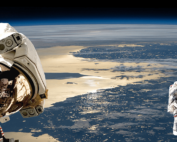Throughout history there have been many examples of unexpected partnerships emerging and powerful demonstrations of teamwork, but arguably none more inspiring than the formidable task of setting up and maintaining the largest man-made satellite in the galaxy; the International Space Station. A project centred around one goal: to further the knowledge of humankind through space exploration and research.
It’s wasn’t an easy goal, and it’s one that would never even have gotten off the ground without the input of literally thousands of people all striving for the same thing. Today the ISS is a shining beacon of international collaboration and teamwork across the globe, so what lessons can we learn from its 20-year history?
Don’t let the past get in the way of the future
It can’t be denied that the history surrounding the conception, construction and conservation of the ISS was fraught with international tension and conflict. The Cold War made space travel a race for supremacy that could have ended in global disaster. But it didn’t. Despite the clashes that came before, the ISS was born out of a unified desire to explore space, and thus previous conflicts were set aside. If the relevant parties hadn’t been able to move on from the incidents of the past, then the ISS would likely never have happened.
In a work situation the height of the rivalry probably won’t reach such epic proportions, but there may well be disagreements between departments that could hamper future progress if people continue to hold on to past grudges. It’s thus important that people are encouraged to think about the bigger picture and how future goals cannot be achieved without the input of everyone. It may require mediation if the discord is particularly severe and it will be vitally important that managers lead by example in this respect, and make the first move where necessary, demonstrating willingness to collaborate regardless of what may have come before.
Find people who are passionate about your cause
The most fundamental reason for success in the case of the ISS is that the vast majority of people working on the project are 100% committed to and passionate about the project. People across the world have come together and joined forces to create something truly spectacular, and this natural enthusiasm and engagement bonds a team far more than anything else ever could.
Space travel is of course quite a niche industry, and it may be hard to find this kind of natural energy and enthusiasm in other fields, but it’s far from impossible. With the right recruitment and development path, accruing an energetic, dynamic and engaged workforce is not only possible, but probable, and can make a huge difference in the success your team. Making sure your people are in the right role, and are fully engaged with what they do, will naturally lead to cohesion; passion is what brings people together.
Locate your experts and use them
The ISS definitely couldn’t have succeeded without the input of a whole host of experts from virtually every field. Obviously those actually being sent into space had specific expertise, but even on the ground, huge teams of scientists, doctors, engineers, operations and support have to work together to make sure the launch is successful, that everyone is kept safe, and that every step of the process runs as smoothly as possible. Teamwork is absolutely critical to this; by working as a team to recognise, support and utilise everyone’s personal expertise and employing it in the most effective way.
Outside of the space station this remains just as true and important; within any organisation there will be individuals with the expertise to make something better, run smoother and work more efficiently. The real key to teamwork is acknowledging this truth and putting it into practice. A good team isn’t about everyone being involved in everything; it is about respecting everyone’s role and supporting each other to do the best they can.
Communicate
The ability to communicate clearly with a satellite 400km away is vital to not only the success of the ISS research, but also the safety of those on board. Of course, it’s easier said than done, and while technology has made it easier than ever to maintain communications, there are always opportunities for errors to occur in understanding. This is why much of the communication is standardised and designed in such a way that when an astronaut relays necessary information, the team at ground control know exactly what they mean. No ambiguity, no danger.
The art of communication is one that is rarely perfected in the commercial world; people work according to their own agenda, and often make incorrect assumptions based on this. But communication is essential to diffuse conflict and ultimately build a strong, cohesive and highly functioning team. Without clear communication you run the risk of creating misunderstandings that can easily lead to errors or animosity and friction within a team. Getting communication flowing is not an easy thing to do, but it is one skill that if implemented successfully, could dramatically change and improve the dynamic and effectiveness of a team, and even turn rivals into powerful collaborators.
It’s not rocket science
The creation and installation of the ISS was a major undertaking that not only helped advance the fields of engineering, electronics and research, but also perfectly encapsulates the human capacity for growth, discovery and collaboration. The efforts of the international team of experts who created the station, can teach us a lot about effective teamwork and willingness to set aside our differences to achieve a higher goal. Teamwork isn’t rocket science, but as it turns out, rocket science is all about teamwork.
If you’d like a more in-depth exploration of how you can Turn Conflict into Collaboration, we have a specialist training course available. Contact us to find out more information and book a session for yourself or your team.
Is It Time For a New Era of Teams?
While the value of individual employees can be important to business success, typically it is the contribution of teams within an organisation that make the real difference. But are teams as we know them [...]
How to Build and Maintain Digital Trust
Building trust, and specifically digital trust, has been an ongoing challenge for many organisations. In certain companies, employees feel like they are not trusted, as highlighted by the historic reluctance of some organisations to [...]
How Volunteering Benefits Professional Development
There are many avenues to achieve career progression; changing roles, participating in development programmes, or undertaking a secondment. But what if these options aren’t available to you or if they don’t provide the right [...]
Team Coaching – the key to unlocking Team Effectiveness
Whatever you do, odds are you work in some sort of team, and how your team perform will make the difference between success and failure in your endeavours. But when we all have our [...]
Four Top Tips for Successful Communication
Understanding Communication skills Whether we like it or not communication is part of our lives, it’s the linchpin of our society, and yet despite its immense importance, it’s astounding how often people get it [...]
Conflict Management, Collaboration and Teamwork – Lessons from Space
Throughout history there have been many examples of unexpected partnerships emerging and powerful demonstrations of teamwork, but arguably none more inspiring than the formidable task of setting up and maintaining the largest man-made satellite [...]






